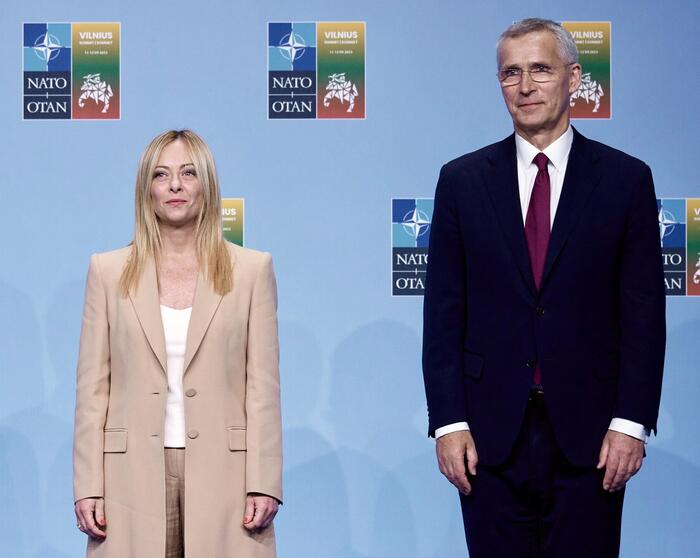Meloni's NATO Strategy: A Focus on Unity
Editor’s Note: Giorgia Meloni's recent pronouncements on NATO strategy have been released today, marking a significant moment in transatlantic relations. This article analyzes her approach and its implications.
Why This Topic Matters
Giorgia Meloni's leadership of Italy, a key NATO member, brings a unique perspective to the alliance's ongoing strategic challenges. Her emphasis on unity within NATO, at a time of geopolitical uncertainty and internal disagreements, is crucial for the alliance's effectiveness in addressing threats from Russia and other actors. Understanding her strategy is vital for anyone following international relations, European politics, and the future of the transatlantic security partnership. This article will examine the core tenets of her approach, analyzing its strengths and potential weaknesses, and considering its broader implications for global security. Keywords relevant to this analysis include: NATO strategy, Giorgia Meloni, Italy, transatlantic relations, European security, geopolitical stability, Russia, Ukraine, alliance unity.
Key Takeaways
| Point | Description |
|---|---|
| Emphasis on Unity | Meloni prioritizes strengthening internal cohesion within NATO. |
| Strengthening Deterrence | Focus on robust defense capabilities and collective response mechanisms. |
| Transatlantic Cooperation | Reinforcing the US-Europe partnership as the cornerstone of NATO's strength. |
| Support for Ukraine | Continued, albeit nuanced, support for Ukraine against Russian aggression. |
| Mediterranean Security | Addressing regional challenges and promoting stability in the Mediterranean. |
Meloni's NATO Strategy
Introduction
Giorgia Meloni's NATO strategy arrives at a critical juncture. The war in Ukraine has exposed vulnerabilities within the alliance, while internal disagreements regarding the best approach to Russia have surfaced. Meloni's focus on unity offers a potential pathway to navigate these complexities.
Key Aspects
Meloni's strategy centers around several key aspects: strengthening transatlantic ties, enhancing collective defense capabilities, and promoting a unified approach to emerging threats. Her approach seeks to avoid unilateral actions, emphasizing the importance of coordinated responses.
Detailed Analysis
Meloni's emphasis on unity isn't merely rhetorical; it's a strategic imperative. A fractured NATO is a weaker NATO. Her commitment to close collaboration with the United States is paramount, ensuring a strong transatlantic partnership. However, this doesn't mean blind adherence; her approach also acknowledges the need for European strategic autonomy, preventing over-reliance on the US. Her nuanced stance on support for Ukraine reflects a pragmatic approach, balancing the need to assist Kyiv with the imperative to avoid escalating the conflict.
Interactive Elements
Strengthening Transatlantic Ties
Introduction: The relationship between the US and Europe is foundational to NATO's success. Meloni's strategy seeks to fortify this bond.
Facets: The key elements include regular high-level dialogues, joint military exercises, shared intelligence, and coordinated responses to global crises. The risk lies in potential disagreements on policy, while mitigation comes from prioritizing mutual interests and open communication. The impact is a more cohesive and robust alliance.
Addressing Mediterranean Security
Introduction: The Mediterranean region faces numerous security challenges, impacting NATO's southern flank.
Further Analysis: These challenges include terrorism, migration flows, and regional instability. Meloni's focus on improving cooperation with regional partners is crucial for enhancing security in this critical area. This includes tackling the root causes of migration and promoting stability through diplomatic initiatives.
Closing: Addressing Mediterranean security challenges directly strengthens NATO's overall resilience, preventing instability from spilling over into other regions.
People Also Ask (NLP-Friendly Answers)
Q1: What is Meloni's NATO strategy?
A: Meloni's NATO strategy prioritizes strengthening alliance unity, enhancing collective defense, and fostering close transatlantic cooperation to address global security challenges.
Q2: Why is Meloni's NATO strategy important?
A: It's crucial because it aims to improve NATO's effectiveness at a time of significant geopolitical uncertainty, focusing on internal cohesion and a unified response to threats.
Q3: How can Meloni's NATO strategy benefit me?
A: A stronger, more unified NATO translates to greater global security and stability, benefitting all member states, including Italy.
Q4: What are the main challenges with Meloni's NATO strategy?
A: Maintaining unity within the alliance, particularly on issues like Ukraine and relations with Russia, remains a significant challenge.
Q5: How to get started with understanding Meloni's NATO strategy?
A: Start by reading official statements, analyzing relevant news reports, and engaging with expert opinions on the topic.
Practical Tips for Understanding Meloni's NATO Strategy
Introduction: Navigating complex geopolitical issues requires informed understanding. These tips will help you better grasp Meloni's strategy.
Tips:
- Follow reputable news sources: Stay informed through trusted media outlets that provide in-depth analysis.
- Read official statements: Consult official government websites and NATO publications.
- Engage with expert analysis: Seek opinions from leading international relations scholars and analysts.
- Compare and contrast: Examine Meloni's strategy in comparison to other NATO members' approaches.
- Consider regional contexts: Understand the geopolitical landscape of the Mediterranean and its implications.
- Track policy developments: Monitor updates on NATO's strategic decisions and initiatives.
- Look for potential conflicts: Analyze potential areas of disagreement or tension within the alliance.
- Evaluate long-term implications: Consider the lasting effects of this strategy on global security.
Summary: By applying these tips, you'll gain a deeper understanding of the intricacies and implications of Meloni's approach.
Transition: Let’s now summarize the key takeaways and conclude our discussion.
Summary (Riepilogo)
Giorgia Meloni's NATO strategy underscores the importance of unity, transatlantic cooperation, and a robust collective defense posture. Its success hinges on addressing internal divisions and navigating complex geopolitical challenges.
Closing Message (Messaggio conclusivo)
Meloni’s focus on unity offers a potential pathway toward a stronger and more effective NATO. However, the road ahead will require continued diplomacy, clear communication, and a shared commitment to the alliance's core principles. What challenges do you foresee in implementing this strategy?
Call to Action (CTA)
Share this insightful analysis with your network! Subscribe to our newsletter for more updates on international affairs and NATO developments. [Link to Newsletter Signup]

